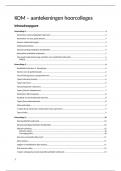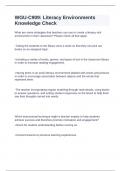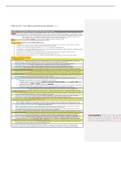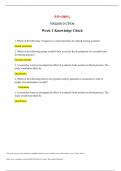Les 1 Media Psychology and Sociology 30september
Introductie
1. Who?
Hoe presenter je jezelf op het internet ? Hoe kunnen we andere beinvloeden?
2. What?
Jaren geleden hadden we geen gsm in bed, we weten dat het slecht is maar toch blijven
we het doen. Hoe beinvoeden smarthpjones onze levens/samenleving.
o 1949 The life of Winston Smith ( angst )
o 1999 Big Brother ( experiment )
o 2007 Fitbit ( use )
o 2017 Strava ( sharing )
Media psychology uses the lens of psychology to study and understand the complex
relationship between humans and the evolving digital environment (Rutledge, 2015)
in het veld, individualisme
Media psychology is the scientific study of human behaviors, thoughts, and feelings
experienced in the context of media use and creation (Dill, 2015)
meetbaar
Media sociology uses the lens of sociology to study and understand the complex relationship
between society and the evolving digital environment (Rutledge, 2015, adapted)
groepsprocessen bv: de social credit system of China ( video )
Its al about the framing, German, Italy social credit system
Good behavior, rewards = voluntary so its different from China. Only rewards and not
punishment.
3. Content courses and evaluation
Slides + extra information on Ufora.
Tutorials = missing the class
Capita Selecta : leerstof
,History
1. Pre – web era
o 1920 : research behavior
Sinds WOII : interesting of mass media ( soc psych and communication )
Hoe is het mogelijk dat zoveel jongeren bereid waren om naar de oorlog te
trekken? Kunnen we mensen op die manier beinvloeden?
o Personal computer : a huge investment, shift: consume create
o 1975 : Microsoft ( Gates and Allen )
o 1985 : Microsoft office : starting with a menu, very easy and accessible
o 1986 : APA Division ’46
o Media psych & soc : interdiciplinair
2. Web 1.0
o 1992 : ARPANet
o 1998 : Larry Page & Sergey Brin Google
Disadvanteges : power to the technichians
Advantages : we have to click on things, we can scan the entire web, its parrarel
o 1999 : Media Psychologie ( first novel )
3. Web 2.0
o 2006 : Facebook
o 2007 : The Iphone, Steve Jobs, a three in one product.
User Interface, User Experience
power to the people, advantage : content production
4. Web 3.0, the semantic web = overload ( fake news )
How can we verify whether this is fake? Example: deepface
5. Web 4.0
AI etc.
,Les 2 Media Psychology and Sociology , Internet
Advantages and Risks
1. Advantages
Communication : The internet allows people to easily communicate and share
information
Learning Environment : Distance learning ( e-learning ), location-blind, time-flexible
Civic participation : projects, the election, GoFunding. Mobilisatie van burgers is
mogelijk.
Social support : social networks, binding van groepen Bridging, heterogene
groepen worden verbonden = voordelen
2. Risks
Contact risks : a direct connections or interaction between offender and victim
Aggressive:
Cyberbullying : victim, wider audience, anonymously
Jessica Laney , Amanda Todd
Cyberstalking
Sexual :
Sexting: Sending self – produced sexualized text etc
Sextortion: Type of Blackmail
Grooming : Adults approaching children online with internet to sexually abuse them
Incorrect or harmful advide on :
Commercial :
Harvesting personal data, Spam, Phishing, ID
Content risks : absence of (or less visible) connection
Aggressive:
violant or hatefull content
gaming etc
Racist Twitter comments
Sexual :
Pornography
, Incorrect or harmful information :
Webpages on suicide, NSSI, eating disorders , racism
Commercial :
Gambling, Copyright, Hybridization
Les 3 Media psychology and sociology ( 7 oktober )
Deel 2 Smarthphone dependency
Facts and figures
Digimeter: The proportion of Flemings who have access to a mobile phone or smartphone
keerpunt in 2014: smartphone is een nieuw medium dat op een snelle manier zijn
intrede heeft gedaat
2018: iedereen heeft minstens 1 smartphone in huis
2017: 55,1% hebben wel angst voor media en zijn privacy
Ook hebben mensen angst voor FOMO zonder social media
privacy parradox
Mere exposure
= Repeated exposure to an object changes the relationship between the object and the
evaluation of the object. We personanliseren onze mobile telefoon, we geraken eraan
gewend.
Classical conditioning
We worden geconditioneerd door geluiden, ringtonen en meldingen.
Russian physiologist Ivan Pavlov (1849-1936):
1904: Pavlov won a Nobel prize :
Method to monitor the digestive processes of dogs (gastric juices)
Food on the tongue (UCS) salivation (UCR) (= reflex)
Observation:
Seeing the food salivation (‘psychological reflex’, 1903)
Method:
Scientific approach: control of procedure and environment
Dependent variable (respons): salivation
Coincidence: tone sound + food permanent behavioral change
Fase 1: met vlees op de tong = kwijl
Fase 2: de toon, het vlees op de tong = kwijl
Fase 3: de toon, begon te kwijlen
= signal learning ( CS voorloper van de UCS )
Introductie
1. Who?
Hoe presenter je jezelf op het internet ? Hoe kunnen we andere beinvloeden?
2. What?
Jaren geleden hadden we geen gsm in bed, we weten dat het slecht is maar toch blijven
we het doen. Hoe beinvoeden smarthpjones onze levens/samenleving.
o 1949 The life of Winston Smith ( angst )
o 1999 Big Brother ( experiment )
o 2007 Fitbit ( use )
o 2017 Strava ( sharing )
Media psychology uses the lens of psychology to study and understand the complex
relationship between humans and the evolving digital environment (Rutledge, 2015)
in het veld, individualisme
Media psychology is the scientific study of human behaviors, thoughts, and feelings
experienced in the context of media use and creation (Dill, 2015)
meetbaar
Media sociology uses the lens of sociology to study and understand the complex relationship
between society and the evolving digital environment (Rutledge, 2015, adapted)
groepsprocessen bv: de social credit system of China ( video )
Its al about the framing, German, Italy social credit system
Good behavior, rewards = voluntary so its different from China. Only rewards and not
punishment.
3. Content courses and evaluation
Slides + extra information on Ufora.
Tutorials = missing the class
Capita Selecta : leerstof
,History
1. Pre – web era
o 1920 : research behavior
Sinds WOII : interesting of mass media ( soc psych and communication )
Hoe is het mogelijk dat zoveel jongeren bereid waren om naar de oorlog te
trekken? Kunnen we mensen op die manier beinvloeden?
o Personal computer : a huge investment, shift: consume create
o 1975 : Microsoft ( Gates and Allen )
o 1985 : Microsoft office : starting with a menu, very easy and accessible
o 1986 : APA Division ’46
o Media psych & soc : interdiciplinair
2. Web 1.0
o 1992 : ARPANet
o 1998 : Larry Page & Sergey Brin Google
Disadvanteges : power to the technichians
Advantages : we have to click on things, we can scan the entire web, its parrarel
o 1999 : Media Psychologie ( first novel )
3. Web 2.0
o 2006 : Facebook
o 2007 : The Iphone, Steve Jobs, a three in one product.
User Interface, User Experience
power to the people, advantage : content production
4. Web 3.0, the semantic web = overload ( fake news )
How can we verify whether this is fake? Example: deepface
5. Web 4.0
AI etc.
,Les 2 Media Psychology and Sociology , Internet
Advantages and Risks
1. Advantages
Communication : The internet allows people to easily communicate and share
information
Learning Environment : Distance learning ( e-learning ), location-blind, time-flexible
Civic participation : projects, the election, GoFunding. Mobilisatie van burgers is
mogelijk.
Social support : social networks, binding van groepen Bridging, heterogene
groepen worden verbonden = voordelen
2. Risks
Contact risks : a direct connections or interaction between offender and victim
Aggressive:
Cyberbullying : victim, wider audience, anonymously
Jessica Laney , Amanda Todd
Cyberstalking
Sexual :
Sexting: Sending self – produced sexualized text etc
Sextortion: Type of Blackmail
Grooming : Adults approaching children online with internet to sexually abuse them
Incorrect or harmful advide on :
Commercial :
Harvesting personal data, Spam, Phishing, ID
Content risks : absence of (or less visible) connection
Aggressive:
violant or hatefull content
gaming etc
Racist Twitter comments
Sexual :
Pornography
, Incorrect or harmful information :
Webpages on suicide, NSSI, eating disorders , racism
Commercial :
Gambling, Copyright, Hybridization
Les 3 Media psychology and sociology ( 7 oktober )
Deel 2 Smarthphone dependency
Facts and figures
Digimeter: The proportion of Flemings who have access to a mobile phone or smartphone
keerpunt in 2014: smartphone is een nieuw medium dat op een snelle manier zijn
intrede heeft gedaat
2018: iedereen heeft minstens 1 smartphone in huis
2017: 55,1% hebben wel angst voor media en zijn privacy
Ook hebben mensen angst voor FOMO zonder social media
privacy parradox
Mere exposure
= Repeated exposure to an object changes the relationship between the object and the
evaluation of the object. We personanliseren onze mobile telefoon, we geraken eraan
gewend.
Classical conditioning
We worden geconditioneerd door geluiden, ringtonen en meldingen.
Russian physiologist Ivan Pavlov (1849-1936):
1904: Pavlov won a Nobel prize :
Method to monitor the digestive processes of dogs (gastric juices)
Food on the tongue (UCS) salivation (UCR) (= reflex)
Observation:
Seeing the food salivation (‘psychological reflex’, 1903)
Method:
Scientific approach: control of procedure and environment
Dependent variable (respons): salivation
Coincidence: tone sound + food permanent behavioral change
Fase 1: met vlees op de tong = kwijl
Fase 2: de toon, het vlees op de tong = kwijl
Fase 3: de toon, begon te kwijlen
= signal learning ( CS voorloper van de UCS )






